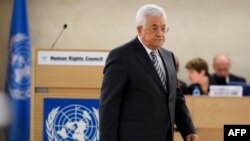The United States on Wednesday opposed a Palestinian push for full membership at the United Nations, with Washington saying it backed statehood but after negotiations with Israel.
"We support the establishment of an independent Palestinian state," U.S. State Department spokesperson Matthew Miller told reporters.
"That is something that should be done through direct negotiations through the parties, something we are pursuing at this time, and not at the United Nations," he said, without explicitly saying that the United States would veto the bid if it reached the Security Council.
Miller said that U.S. Secretary of State Antony Blinken has been actively engaged in establishing "security guarantees" for Israel as part of the groundwork for a Palestinian state.
U.S. President Joe Biden's administration has increasingly highlighted support for a Palestinian state, with a reformed Palestinian Authority in charge in the West Bank and Gaza, as it looks for a way to close the ongoing war in which its ally Israel is seeking to eliminate Hamas from the Gaza Strip.
Israeli Prime Minister Benjamin Netanyahu has for decades resisted a Palestinian state and leads a far-right government with members hostile to the Palestinian Authority, which holds limited autonomy in sections of the West Bank.
Under longstanding legislation by the U.S. Congress, the United States is required to cut off funding to U.N. agencies that give full membership to a Palestinian state.
The law has been applied selectively. The United States cut off funding in 2011 and later withdrew from the U.N. cultural and scientific agency UNESCO, but Biden's administration returned, saying it was better to be present.
Robert Wood, the U.S. deputy representative to the United Nations, said that recognition of a Palestinian state by the world body would mean "funding would be cut off to the U.N. system, so we're bound by U.S. law."
"Our hope is that they don't pursue that, but that's up to them," Wood said of the Palestinians' bid.
The Palestinian Authority has submitted a letter to U.N. Secretary-General Antonio Guterres asking for the Security Council to reconsider a longstanding application for statehood in April.
Any request to become a U.N. member state must first be recommended by the Security Council, where Israel's primary backer the United States as well as four other countries wield vetoes, and then endorsed by a two-thirds majority in the General Assembly.
Palestinian President Mahmud Abbas launched the statehood application in 2011. It was not considered by the Security Council, but the General Assembly the following year granted observer status to the "State of Palestine."




